KENYA: The little village that could
KITUI , 22 May 2008 (PlusNews) - The word 'nyumbani' means home in Swahili, and that is exactly what a pilot village in the eastern Kenyan district of Kitui is trying to provide for two generations devastated by the AIDS pandemic.
More than 250 orphans and 29 elderly people, all of whom have lost parents and children to AIDS-related illnesses live in the village. The children are placed under the guardianship of a grandparent - not necessarily their own - who is responsible for creating an atmosphere as close to a normal home environment as possible.
Most non-governmental organisations (NGOs) dealing with orphans and vulnerable children believe that placing children in extended family units in the communities they have lived in since birth is preferable to placing them in the unnatural environment of an institution, but many families are unable to cope with the additional mouths to feed and the orphans often end up homeless.
"Many of the children here were destitute, roaming the villages, begging or scavenging for food once their parents died," said Sister Mary Owens, co-founder of Nyumbani Village. "The village is halfway between an institution and the community. We try as much as possible to simulate normal village life, with grandparents and the children forming blended families." The village also tries to ensure that the children are brought up in the local Kamba tradition, and there is a separate house to accommodate older boys who have gone through the circumcision ritual. The village was opened in 2005 on 1,000 acres of land donated by the government of Kenya to the Roman Catholic Diocese of Kitui. Its youngest resident is two-and-a-half year old Tito, and its oldest is Monica, who is well into her nineties. "Being with the children keeps me feeling young," said Malonza Malembwa, one of two resident grandfathers. He does not know his age, but believes he is well over eighty, having been born around the time of "the great famine" in 1920. Malembwa has eight boys in his care: four are his biological grandchildren and the other four were placed with him after he came to the village. Being with the children keeps me feeling young
"When my daughter and son died, I couldn't afford to feed the grandchildren, so the Catholic Church took them in and fed them; when the village opened we all came here," he told IRIN/PlusNews. "Before we got here my grandsons and I were casual labourers on building sites, but now they are all in school."
Although the HIV prevalence rate of 3.9 percent in Kitui is lower than the national average of 5 percent, the risk factors for HIV are high. Migratory labour is common in eastern Kenya's arid climate, and men are often away from home for weeks at a time, during which they may have several sexual partners, heightening the risk of HIV transmission to their wives when they return. Poverty and food shortages also sometimes drive women into commercial sex work. Competition for a place in the Nyumbani village is also high (the waiting list is currently 130), so the criteria for entry are strictly enforced. "The children must be double orphans [they have lost both parents] with no extended family; they must be destitute and the grandparent must also be destitute," Owens said. "We use a committee that includes a social worker, community leaders and religious leaders to help us make the choice and ensure only those who really have no other option are taken in." The younger children attend a primary school in the village, while older ones go to secondary boarding schools in the district. Extra-curricular activities in the village include HIV education and sessions on sexuality and relationships, and teenagers are trained in carpentry, dress-making and other trades. A clinic in the village, which is also open to people from the neighbouring community, treats minor illnesses, but more serious cases are referred to Kitui District Hospital.
Towards sustainability Nyumbani has livestock and grows its own food, using drip irrigation powered by solar panels. Solar electricity is also used to light the streets, and plans are underway to use solar power for lighting homes. The village uses water-saving eco-toilets and recycles bath water for watering the farm's fruits and vegetables. "We aim to be fully self-sustaining within 10 years," Owens said. "We grow organic food that feeds the families; we sell the surplus to organic food shops in Nairobi."
The village is also piloting the growth of 50 acres of jatropha oil - a vegetable oil used in the production of biofuel - as well as an agro-forestry scheme to produce timber and charcoal for cooking and selling. Most of the farm work is done by casual labourers from the neighbouring community. "I never thought I could sit around most of the day without really working hard," said Janet Kithika, one of the grandmothers. "But now my job is to care for the children, which is tiring but also rewarding." She is raising 11 children, the largest number of any grandparent at Nyumbani. A challenging start Helping grandparents to discipline and manage sometimes rebellious adolescent children has been a particular challenge, Owens said. "Relocating from their homes is sometimes difficult, as is adapting to the new village setting." At least three grandparents have voluntarily left the village since it started, unable to cope with the responsibility; a few of the older children have also left.
The village has an on-site counsellor and a several social workers to help people solve the up and downs of daily life. "We are experiencing some teething problems, but we are learning on the job; however hard you prepare, there are things you cannot anticipate," Owens said. New houses are being built and at least 150 new orphans and 15 grandparents are expected to move in during the next year. Future plans include building a voluntary counselling and HIV testing centre for the village and neighbouring community, as well as starting a community-based outreach programme to provide medical and social support to children in the community infected or affected by HIV. Ultimately, Owens' vision is to replicate Nyumbani village across Kenya, where more than one million Kenyan children have lost at least one parent to HIV.
skip to main |
skip to sidebar

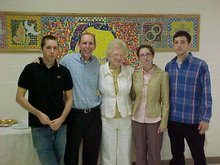

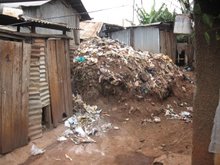
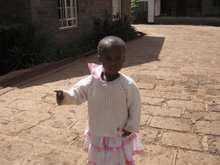

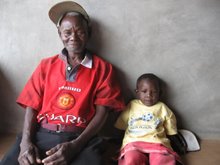
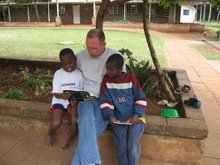


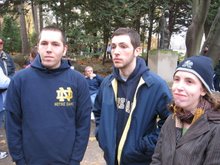
At ND Game

I am this grateful!

Ed and Chris


OLD TOWN

Assisi 2006

A Leap
The spiritual journey is one of continually falling on your face, getting up, brushing yourself off, looking sheepishly at God, and taking another step.
THE MASAI WOMEN EMPOWERMENT PROJECT
For more information on the Masai Project in Athi River, please visit the following site:
www.mwep.blogspot.com
To donate: please see below.
www.mwep.blogspot.com
To donate: please see below.

DONATE
WANT TO DONATE?
If you would like to donate to my journey and my projects in Kenya, checks may be sent to :
Immaculate Heart of Mary Parish
MISSION FUND
5876 Veterans Way
Burlington KY 41005
Make sure it is marked clearly for Ed Colina's Mission work.
If you would like to donate to my journey and my projects in Kenya, checks may be sent to :
Immaculate Heart of Mary Parish
MISSION FUND
5876 Veterans Way
Burlington KY 41005
Make sure it is marked clearly for Ed Colina's Mission work.
LOOK AT SOME PICS OF THE VILLAGE - Some other good VILLAGE BLOGS
UPDATE PICS ON FLICKR
ALSO - CHECK OUT MICHAEL'S AFRICAN BLOG
Jennifers Blog from Kenya - More Village Info
Both have info and pictures from the Nyumbani Village
ALSO - CHECK OUT MICHAEL'S AFRICAN BLOG
Jennifers Blog from Kenya - More Village Info
Both have info and pictures from the Nyumbani Village
CONTACTING E.M.C.
COOL SITE
The best way to contact me beginning in September is via email. I'll get it when I can. I am not sure how often I will be able to get into Nairobi from the Village - whether monthly or less frequently. ecolina@aol.com Pics should be posted here.
Donations can be made via the school. 859 689-4303 They will be forwarded to me by my daughter. It is all appreciated and will be well-used!
Packages to Kenya are discouraged because of the customs costs upon arrival. Snail mail can be sent to the address listed here and I'll get mail when in Nairobi. Email is probably best.
Beginning August 14th my U.S. cell phone is no longer in operation.
The best way to contact me beginning in September is via email. I'll get it when I can. I am not sure how often I will be able to get into Nairobi from the Village - whether monthly or less frequently. ecolina@aol.com Pics should be posted here.
Donations can be made via the school. 859 689-4303 They will be forwarded to me by my daughter. It is all appreciated and will be well-used!
Packages to Kenya are discouraged because of the customs costs upon arrival. Snail mail can be sent to the address listed here and I'll get mail when in Nairobi. Email is probably best.
Beginning August 14th my U.S. cell phone is no longer in operation.
Family Celebration

By Mahatma Gandhi
Recall the face of the poorest peson you have seen and ask yourself if the next step you take is going to be of any use to that person.
"Feed the Children" Video Clips
There are a couple of interesting Kibera Slums video clips from Feed the Children Organization. I have no association with the organization but was interested in the clips. CLIPS HERE


Some Background on Kibera Slum
The slum originated in 1920 as a Nubian soldiers' settlement. The British colonial government of the time allowed them to squat on a hillside outside Nairobi, primarily because the British felt the Nubian population could be trusted during the Kikuyu-dominated Mau Mau movement of the 1950s.
After Kenyan independence in 1963, however, various forms of housing were made illegal by the government, rendering Kibera unauthorised on the basis of land tenure. Essentially, since the early 1970s landlords have rented out their property to a significantly greater number of tenants than legality permits. Since the tenants, who are extremely poor, are unable to obtain or rent land that is "legal" according to the Kenyan government, the slum-dwellers find the rates offered to be comparatively affordable. The number of residents in Kibera has increased accordingly despite its unauthorised nature.
This process has been exacerbated because, over time, other tribes have moved into the area to rent land from the Nubian landlords. Since then, the Kikuyu have come to predominate the population and by 1974 had effectively gained control over administrative positions. This demographic change subsequently determined which of the dwellings, all of which are technically illegal, are demolished or permitted by the government. This occurs primarily through political patronage, as certain owners are protected by local government officers largely based on their Kikuyu ethnicity, and changes in administrative personnel may have drastic impacts on a landlord's security.
Kibera has residents coming from all the major ethnic backgrounds with some areas being specifically dominated by one tribe (eg. Kisumu Ndogo that is predominantly Luo). Many are coming from rural areas due to the problems of rural underdevelopment. This multi-ethnic nature coupled with the tribalism of Kenyan politics has led Kibera to be the site of small ethnic conflicts throughout its near 100 year history (most recently in 2002 in which many resident's homes were attacked by arson).
Kibera is located southwest of Nairobi city centre and is the same size as Manhattan's Central Park (approximately 2.5 square kilometres (600 acres)). Nairobi Dam is to the south. It is sited approximately 5 km south east of the city centre of Nairobi. It holds more than a quarter of Nairobi's population. The estimated population density is 300,000/km². There are a number of villages, including Kianda, Soweto, Gatwekera, Kisumu Ndogo, Lindi, Laini Saba, Siranga/Undugu, Makina and Mashimoni.
A railway line passes through Kibera, thus passengers heading for Kisumu can view the slum. Kibera has a railway station, but due to absence of effective commuter train system in Nairobi, most Kibera residents use buses and Matatus to reach city centre. However, riding the Matatus proves to be considerably dangerous, due to the occasional carjacking that goes on in Nairobi especially in the evenings and at the end of the month. Irresponsible driving in the area and poor traffic law enforcement also makes travel perilous.
Kibera is heavily polluted by soot, dust, and other wastes. Open sewage routes, in addition to the common use of Flying toilets, also contribute to contamination of the slum with human and animal faeces. The combination of poor nutrition and lack of sanitation accounts for many illnesses. Not only are death by disease and conflict common inside this slum, but it is estimated that 1/5 of the 2.2 million Kenyans living with HIV live in Kibera.
Winnie - 2 Years Old

NYUMBANI INFORMATION
Kibera Podcast - Mature Viewing

Radio Interview with Fr. D'Agostino
KIMANZI AND A GRANDFATHER

AIDS in Africa
Presently there are 40 million people infected with HIV/AIDS globally, with more being infected every day. HIV/AIDS is 100% lethal if left untreated. The UN estimates that 68 million people will die in sub-Saharan Africa because of AIDS in the next twenty years.
That is:1.7 times more than the 40 million deaths in World War II, the most destructive war in human history.
5 times more than the 13 million deaths in the previous two decades of the AIDS epidemic.
307 times more than the 221,000 deaths in the Asian tsunami disaster of 2004.
Other Statistics:In 1990 there were 7 million people infected with HIV/AIDS in sub-Saharan Africa.
In 2000 there were 25.3 million infected.96 percent of HIV infected persons live in developing nations where drug therapies are largely unaffordable.
Presently there are approximately 15 million children orphaned by AIDS in sub-Saharan Africa. That number is expected to grow to 40 million in the next two decades.
3 million people died of AIDS in 2000. 12.1 million children were orphaned.
Every 5 minutes 3 people die of HIV/AIDS. That is over 850 deaths every day or 315,000 a year. With each death, at least one more orphan is usually left.
Every minute 10 people are infected with HIV/AIDS, which equates to 600 new infections an hour, 15,000 a day.
Friends

EMC in ASSISI

Enquirer Article
I agreed to talk to the Enquirer in hopes that it might more widely advertise our search for a new principal. I appreciate the article but am embarrassed. Now it's official - I have to do something! Here it is.
Fun . . .
"Pulling out the chair beneath your mind And watching you fall upon God - There is nothing else for Hafiz to do that is any fun in this world!"-Shamsud-din Mohammed Hafiz Muslim Mystic (1320-89)
Ash Barker - Make Poverty Personal
"The idols of this age say you can buy meaning in life in a department store, while the real God weeps that creation has swallowed such delusions whole without chewing and longs for us to love our neighbour in need. The starving millions have no voice against the shrieks of temporal happiness those pursuing such items risk all for. Authentic loving of God and neighbour then is still the great need of the hour ."

Henri Nouwen
"People who pray stand receptive before the world. They no longer grab but caress, they no longer bite but kiss, they no longer examine but admire."
Merton Gets It Right
"My first human act is the recognition of how much I owe everybody else."
My 3 Loves

At ND Game
Zermatt Summer 2006

I am this grateful!
For Times Like These

Ed and Chris
New Year's Eve Prayer
God of the seasons, Lover of the ages, Master of every moment: You who are beyond time yet within all time. We return to you what you have given to us — the moments, the minutes, the hours, the days, the weeks, the months, and the year of 2006. Time has been gracious to us again, and we thank you for freely giving us these human bodies, these events, and these relationships. We have lived another year and we have died another year, and now you are granting us the beginnings of another.
We now hand over to you the blessed year, 2006, with all that it gave us and all that it took from us, knowing that both are necessary, just like our breath. We trust you in both the givings and the takings, the inhalings and the exhalings. May every breath of 2007 be a breath of the Holy Spirit, joyfully received and joyfully returned, beginning with this one right now.
Amen
God Alone-New Year's Eve

Merton Speaks
"MY LORD GOD, I have no idea where I am going. I do not see the road ahead of me. I cannot know for certain where it will end. Nor do I really know myself, and the fact that I think that I am following your will does not mean that I am actually doing so. But I believe that the desire to please you does in fact please you. And I hope I have that desire in all that I am doing. I hope that I will never do anything apart from that desire. And I know that if I do this you will lead me by the right road though I may know nothing about it. Therefore will I trust you always though I may seem to be lost and in the shadow of death. I will not fear, for you are ever with me, and you will never leave me to face my perils alone."
New Years - New Mexico

OLD TOWN
Perfect Joy

Assisi 2006
Blog Archive
- August (1)
- June (1)
- May (10)
- April (7)
- March (21)
- February (5)
- January (4)
- December (8)
- November (5)
- October (1)
- September (5)
- August (3)
- July (4)
- June (10)
- May (6)
- April (1)
- March (5)
- February (11)
- December (15)
- November (10)
- October (15)
- September (8)
- August (13)
- July (7)
- June (7)
- May (5)
- April (13)
- March (8)
- February (10)
- January (8)
Interlaken Summer 2006

A Leap